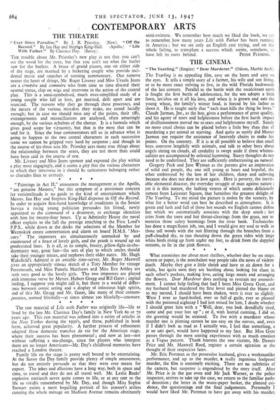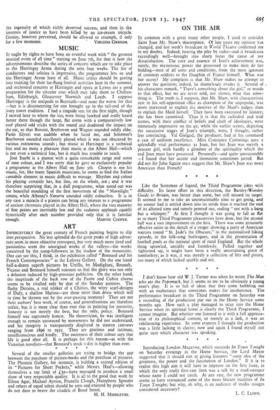THE CINEMA
" The Yearling." (Empire) " Dear Murderer." (Odeon, Marble Arch).
The Yearling is an appealing film, easy on the heart and easy on the eyes. It tells a simple story of a farmer, his wife and son living, or to be more exact striving to live, in the wild -Florida backwoods of the last century. Parallel to the battle with the recalcitrant earth is fought the first battle of adolescence, for the son adopts a little fawn, lavishes on it all his love, and when it is grown and eats the young wheat, the family's winter food, is forced by his father to shoot it. He is taught early that " each man kills the thing he loves." Claude Jarman, Jnr., as the boy, gives a performance of great quality, and his agony of tears and helplessness before the first harsh impact of disillusionment moved me to tears and helplessness myself. Surely no more cruel choice can be placed before a little boy :than that of murdering a pet animal or starving. And quite as surely did Master Jarman not require the assistance of heavenly choirs to make his points. On the contrary. If it is at all possible to believe that small boys converse lengthily with animals, and talk to other boys about angels sitting on clouds, all credulity is swept aside if these whimsi- calities are accompanied by celestial humming. Starry thoughts do not need to be underlined. They are sufficiently embarrassing au naturel.
Gregory Peck and Jane Wyman as the parents give an impression of solid real people, the one still young at heart and hopeful, the other embittered by the loss of her children, sharp and unloving because she does not dare to love again. Here is poverty, the inevit- able elemental disaster, the everyday struggle of man against nature ; yet it is this nature, the lurking venom of which seems deliciously remote from Leicester Square, that furnishes the greatest delight of The Yearling. To my mind the picture is stolen by the scenery, by what for a better word can best be described as atmosphere. It is green and lush and full of those hot sounds we English cannot define but which we automatically associate with the deep south ; hot cries from the trees and hot throat-clearings from the grass, not to mention those sultry boomings from the river bank. Technicolor has done a magnificent job, too, and I would give my soul to walk in those tall woods with the sun filtering through the branches from a puff-clouded sky, to run shouting down the green rides with large white birds rising up from under my feet, to drink from the dappled streams, to lie in the pink flowers.
* * * *
What astonishes .me about most thrillers, whether they be on stage, screen or paper, is the nonchalant way people take the news of violent death. Maybe they give a little shriek and have to sit down for a while, but quite soon they are bustling about looking for clues in each other's pockets, making love, eating large meals and arranging the flowers. Dear Murderer does nothing to restrain my astonish- ment. I cannot help feeling that had I been Miss Greta Gynt, and my husband had murdered my first lover and pinned the blame on to my second, I should have been shaken, were it ever so slightly. Were I ever so hard-boiled, ever so full of guile, ever so pleased with the poisoned nightcap I had just mixed for him, I doubt whether I should greet him with a " Well, dear, you look dreadfully tired, come and put your feet up " ; or if, with horrid cunning, I did so, the greeting would be strained. To live with a murderer whose murder one is plotting cannot be too easy on the nerves, and, even if I 'didn't look as mad as I actually was, I feel that something, a je ne sail quoi, would have happened to my face. But Miss Gym passes through the most searing experiences with as much emotion as a Vogue pattern. Thank heavens the two victims, Mr. Dennis Price and Mr. Maxwell Reed, register a certain agitation at the thought of their respective fates.
Mr. Eric Portman as the possessive husband, gives a workmanlike performance, and up to the murder, a really ingenious foolproof murder, the film is extremely exciting. There are no subtleties of the camera, but suspense is engendered by the story itself. After Mr. Price is in the gas oven arid Mr Jack Warner, as the police inspector, arrives to take up the case, we return to the familiar paths of detection ; the letter in the waste-paper basket, the planted evi- dence, the questionings and the final judgements. Personally I would have liked Mr. Portman to have gtit away with his murder, the ingenuity of which richly deserved success, and then in the interests of justice to have been killed by an ice-cream tricycle. Genius, however perverted, should be allowed to triumph, if only



































 Previous page
Previous page